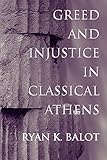Greed and Injustice in Classical Athens / Ryan K. Balot.
Material type: TextPublisher: Princeton, NJ : Princeton University Press, [2020]Copyright date: ©2002Description: 1 online resource (312 p.)Content type:
TextPublisher: Princeton, NJ : Princeton University Press, [2020]Copyright date: ©2002Description: 1 online resource (312 p.)Content type: - 9780691220154
- Avarice -- Greece -- Athens -- History
- Distributive justice -- Greece -- Athens -- History
- Philosophy, Ancient
- HISTORY / Ancient / Greece
- Adeimantus
- Alcibiades
- Anonymus Iamblichi
- Athenagoras
- Cephalus
- Cleomenes of Sparta
- Critias
- Delphic oracle
- Eratosthenes
- Eteocles
- Four Hundred (Athens)
- Glaucon
- Hermocrates
- Jocasta
- Keynes, John Maynard
- Lysias
- Marathon
- Megarian aristocracy
- Nicias
- Odysseus
- Old Oligarch
- Olympic games
- Peloponnesian War
- Plutarch
- Polemarchus
- Raaflaub, K. A
- Samos
- Syracuse
- Themistocles
- Theognis
- Theramenes
- Xenophon
- Zelizer, Viviana
- demagogues, injustice
- immoralists
- natural acquisition
- symposiastic disruption
- 178/.0938/5 23
- online - DeGruyter
| Item type | Current library | Call number | URL | Status | Notes | Barcode | |
|---|---|---|---|---|---|---|---|
 eBook
eBook
|
Biblioteca "Angelicum" Pont. Univ. S.Tommaso d'Aquino Nuvola online | online - DeGruyter (Browse shelf(Opens below)) | Online access | Not for loan (Accesso limitato) | Accesso per gli utenti autorizzati / Access for authorized users | (dgr)9780691220154 |
Frontmatter -- Contents -- Preface and Acknowledgments -- Abbreviations -- 1. Introduction -- 2. Greed in Aristotle's Political Thought -- 3. Solonian Athens and the Archaic Roots of Greed -- 4. Herodotus and the Greed of Imperialism -- 5. Thucydides, Greed, and the Breakdown of Political Community -- 6. "Revolution Matters"? Oligarchic Rebellion and Democratic Hegemony in Athens -- 7. Epilogue: Plato's Republic in Context -- Bibliography -- Index Locorum -- General Index
restricted access online access with authorization star
http://purl.org/coar/access_right/c_16ec
In this original and rewarding combination of intellectual and political history, Ryan Balot offers a thorough historical and sociological interpretation of classical Athens centered on the notion of greed. Integrating ancient philosophy, poetry, and history, and drawing on modern political thought, the author demonstrates that the Athenian discourse on greed was an essential component of Greek social development and political history. Over time, the Athenians developed sophisticated psychological and political accounts of acquisitiveness and a correspondingly rich vocabulary to describe and condemn it. Greed figures repeatedly as an object of criticism in authors as diverse as Solon, Thucydides, and Plato--all of whom addressed the social disruptions caused by it, as well as the inadequacy of lives focused on it. Because of its ethical significance, greed surfaced frequently in theoretical debates about democracy and oligarchy. Ultimately, critiques of greed--particularly the charge that it is unjust--were built into the robust accounts of justice formulated by many philosophers, including Plato and Aristotle. Such critiques of greed both reflected and were inextricably knitted into economic history and political events, including the coups of 411 and 404 B.C. Balot contrasts ancient Greek thought on distributive justice with later Western traditions, with implications for political and economic history well beyond the classical period. Because the belief that greed is good holds a dominant position in modern justifications of capitalism, this study provides a deep historical context within which such justifications can be reexamined and, perhaps, found wanting.
Mode of access: Internet via World Wide Web.
In English.
Description based on online resource; title from PDF title page (publisher's Web site, viewed 02. Feb 2021)


